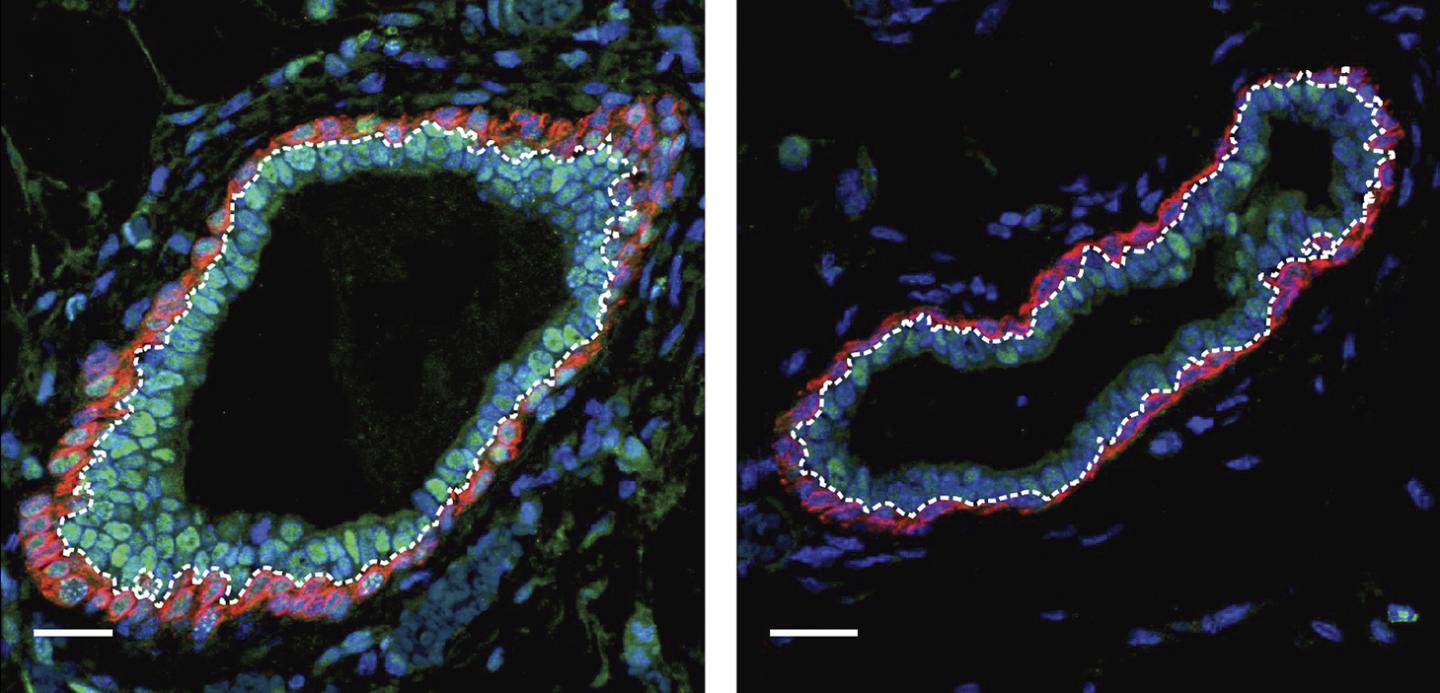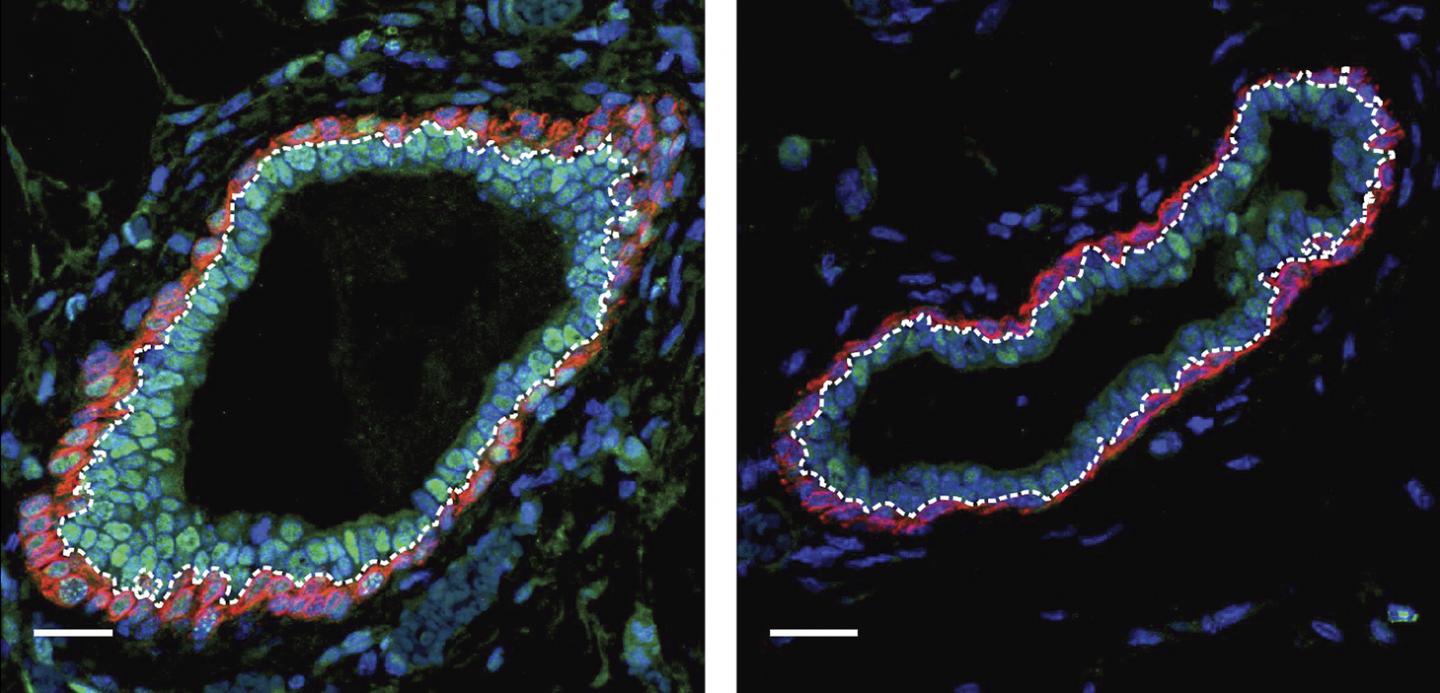
Credit: Casey et al., 2018
Researchers at the Princess Margaret Cancer Centre in Toronto have discovered that epigenetic proteins promote the proliferation of mammary gland stem cells in response to the sex hormone progesterone. The study, which will be published June 19 in the Journal of Cell Biology, suggests that inhibiting these proteins with drugs could prevent the development of breast cancer in women at high risk of the disease.
Mammary glands contain two types of cells, basal and luminal, that arise from specialized stem or progenitor cells. During pregnancy or the menstrual cycle, progesterone induces basal and luminal progenitor cell numbers to expand and drive mammary gland formation. But mammary gland progenitors may also give rise to cancer. Progesterone exposure and stem cell proliferation have been linked to the development of breast cancer, and the number of progenitor cells is often elevated in women carrying mutations in BRCA1 or other genes that put them at a high risk of developing the disease.
"Currently, there are no standard of care preventative interventions for women at high risk of breast cancer," says Dr. Rama Khokha, a Senior Scientist at Princess Margaret Cancer Centre and Professor of Medical Biophysics at the University of Toronto. "Although it is becoming increasingly clear that stem and progenitor cells underlie cancer development, we lack strategies to target these cells for chemoprevention."
To learn more about these progenitor cells and identify any vulnerabilities that could potentially be exploited to prevent the development of breast cancer, Khokha and colleagues isolated cells from the mammary glands of mice and examined how they changed in response to progesterone. The researchers had previously measured all of the RNA molecules produced by mammary gland cells. Now they quantified all of the cells' proteins and assessed the cells' epigenomes–the various chemical modifications to a cell's chromosomes that help determine which genes are turned on and off.
This global overview of mammary gland cells revealed that in response to progesterone, progenitor cells–particularly luminal progenitor cells–up-regulate many of the epigenetic regulatory proteins responsible for modifying the cells' chromosomes.
"We thought that drugs that inhibit these epigenetic regulatory proteins might suppress the proliferation of stem and progenitor cells in response to progesterone," Khokha says.
The researchers tested multiple epigenetic inhibitors, many of which are already approved for use in humans by the FDA. Several of these drugs inhibited the proliferation of mammary gland progenitor cells and decreased their total number in mice. One, a drug called decitabine that inhibits DNA methyltransferase enzymes and is approved to treat myelodysplastic syndrome, delayed the formation of tumors in breast cancer-prone rodents.
Khokha and colleagues then tested the effects of epigenetic inhibitors on mammary gland progenitor cells isolated from women at high risk of developing breast cancer. Progenitor cells from patients with BRCA1 mutations were particularly vulnerable to epigenetic inhibitors, including decitabine. Decitabine also suppressed the activity of progenitor cells from patients with mutations in the BRCA2 gene.
"This demonstrates that the dependency of progenitor cells on specific epigenetic proteins is conserved between mice and humans and highlights the potential of epigenetic therapies to target these important cell types in the human breast as a form of chemoprevention," says Khokha.
###
Casey et al., 2018. J. Cell Biol. http://jcb.rupress.org/cgi/doi/10.1083/jcb.201804042?PR
About the Journal of Cell Biology
The Journal of Cell Biology (JCB) features peer-reviewed research on all aspects of cellular structure and function. All editorial decisions are made by research-active scientists in conjunction with in-house scientific editors. JCB makes all of its content free online no later than six months after publication. Established in 1955, JCB is published by the Rockefeller University Press. For more information, visit http://jcb.rupress.org/.
Visit our Newsroom, and sign up for a weekly preview of articles to be published. Embargoed media alerts are for journalists only.
Follow JCB on Twitter at @JCellBiol and @RockUPress.
Media Contact
Ben Short
[email protected]
@RockUPress
http://www.rupress.org/
Original Source
http://jcb.rupress.org/cgi/doi/10.1083/jcb.201804042?PR http://dx.doi.org/10.1083/jcb.201804042





